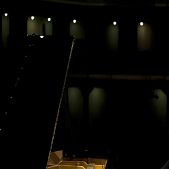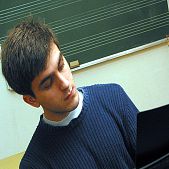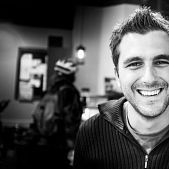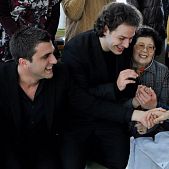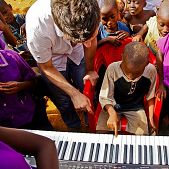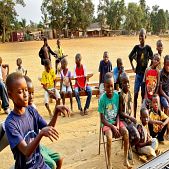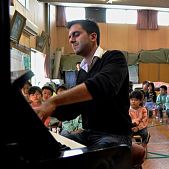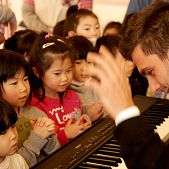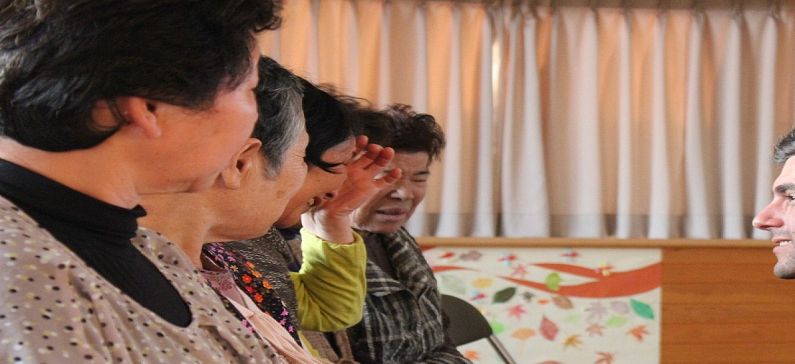
Please, tell us a few things about you. Where did you go to school, where did you study, how did you discover that music was your thing?
Since my early age, I was magnetized by the raw force of the stage. In our home, there was always music. I recall going to concerts and having a piano. I received my first piano lesson at the age of 7 and I have a memory of myself wishing nothing else than to play music. I graduated from the American College in Greece and then studied music at the Royal Academy of Music in London.
The road to success is bumpy and the voyage to accomplishment is stormy, I imagine, especially in your field.
Accomplishment in anything is hard. I started playing the piano at the age of 7 and I was lucky to having grown up in a family that helped me in pursuing my dream. When I was at high school, there were days that I studied the piano for 12-13 hours, not because I had to, as I had to do my homework, but because I wanted to. When hard work is combined with deep love for something, there is neither fatigue nor deprivation. Moreover, there is no scale for success.
What are your future plans?
To travel, play music, eat good food, meet new people, do yoga and meditate, read books. Not necessarily in this specific order!
You travel with your group to remote places and play music in areas where children have possibly never seen a music instrument before. Tell us a few things about this experience and about Keys of Change and also the reasons that inspired you to establish it.
Maybe because my piano teacher used to joke saying, “If everybody played the piano, there would be no war”, or maybe thanks to her true wish to make me realize the real power of classical music, or even because I was losing interest in being listened by people who could afford a ticket. However, one thing’s sure. I take very seriously the cliché music can change the world. One part of this initiative that interests me passionately is that it cannot be valued based on the common standards of success or failure. Certainly, the piano sinking in the river and me not being able to play wouldn’t be an ideal scenario. But the fact that we have the opportunity to share music can’t be experienced other than as a positive event for everybody.
You have already completed missions to Sierra Leone and other areas. What are your plans for other parts of the world? Describe images from your trips with the organization that stayed in your mind.
Sierra Leone, for instance. Although they are not familiar with classical music, they feel it in their heart; they get inspired and express themselves through movement in a magnificent way. Who would imagine people dancing beautifully to music they have never heard before? A group of ex-prostitutes jumped off their chairs to dance to Greek music and then to Tchaikovsky. One thousand prisoners revolted by stamping their feet to the rhythm of Händel. A group of blind children gave a spectacular performance listening to Chopin and jumping in a small room, freely expressing new music in the most fresh and beautiful way, perhaps because nobody had told them that they couldn’t. One of those children touched my hand gently and whispered sweetly, “Diamond fingers”.
Let’s talk now about Japan. Every face carries a story of survival, a story of life and death by the tsunami. The look of destruction, the sounds, the sirens, the lost friends, they are all painted on their faces. The face of an old fisherman that had lost everything, the face of a volunteer helping others after having lost her father and home, the face of a 10-year old boy with the gaze of a grown-up. “Isinomaki, be strong” is the engraved message on a commemorative monument in the middle of the wrecked area, in a place that was donated to the local municipality by a woman who had lost her shop. I will never forget a man at the hospital of Minamisoma, the front line for measuring radiation effects on people, who asked the nurse to move his wheelchair closer and tried to talk, to say something while tears were filling up his eyes, he tried again and more tears were falling down his face, a face wrinkled by suffering and he finally just whispered, “Arigato”. One more survivor. I met a woman keeping a music toy at her home that played the Nutcracker; she lost everything by the tsunami and started crying when she heard Tchaikovsky. I played a recital in one of the temporary shelters, where everybody cried at the sound of Sakura, trying in vain to hold the sighs of sorrow. Smiles and tears, no translation, no words, no language. And the local survivor of music: a Yamaha piano that was damaged by the tsunami and later repaired by the shop owner, only to gain world popularity as a symbol of renaissance.
Is life abroad hard? Do you miss Greece?
I miss the sun, the clear skies and the blue sea.
I suppose you are following developments in the socioeconomic life. Do you believe that our status will improve soon?
Every change, good or bad, is in our hands. I believe that improvement is a need of humanity, but only when we realize that conscious actions are necessary for change to occur. In music, we face problems all the time when studying a new piece and trying to improve the technical performance. Perhaps, if we see a problem as a challenge for improvement, forward steps will be faster.
Do you plan to return to Greece in the future? Is there space available for music here?
Greece has its own way of drawing away its ambitious children. I have met some of the most brilliant Greeks abroad. Greece has never stopped being my homeland, because I was born and have grown up here and because my family still lives here. However, as a pianist, I travel a lot and my home can be anywhere in the world.
What does Greece mean to you?
Greece is my homeland and I am always attracted back to the country. Especially now that I have been living abroad for over 12 years, I picture Greece like a magic island, full of people capable of incredible things.
What is your top question to Greeks?
If I don’t eat Christmas sugared buns and Easter lamb, if I don’t drink iced coffee and play backgammon, if I don’t chat neither about soccer nor politics, if I don’t think that entertainment means dancing on tables until dawn, am I Greek?
A pianist touring with his music around the world’s remote countries
Panos Karan was born in 1982 in Crete and grew up in Athens. At the early age of 7, he started receiving piano lessons and had excelled among his fellow students. He was later educated at the Royal Academy of Music.
Karan made his professional debut in London at the age of 19 at the Southbank Centre. In 2004, he performed at the International Piano Competition in Valencia of Spain, where he was awarded after his appearance in the finals with the Valencia Symphony Orchestra.
He has appeared in Europe and worldwide and in 2009 he released his first solo album Rachmaninov Piano Concerto No. 3 and the Orion Symphony Orchestra. In January 2011, Panos Karan visited Greece for performing at the Megaron Athens Concert Hall next to the Athens State Orchestra, receiving praising critics.
Keys of Change is Karan’s non profitable organization aiming at changing the world through music. For that cause, his mission is to perform together with his team in the world’s remote countries, like Uganda, Peru and Ecuador, Japan and Sierra Leone.
Read below Panos Karan’s interview at ellines.com
INTERVIEW...
Please, tell us a few things about you. Where did you go to school, where did you study, how did you discover that music was your thing?
Since my early age, I was magnetized by the raw force of the stage. In our home, there was always music. I recall going to concerts and having a piano. I received my first piano lesson at the age of 7 and I have a memory of myself wishing nothing else than to play music. I graduated from the American College in Greece and then studied music at the Royal Academy of Music in London.
The road to success is bumpy and the voyage to accomplishment is stormy, I imagine, especially in your field.
Accomplishment in anything is hard. I started playing the piano at the age of 7 and I was lucky to having grown up in a family that helped me in pursuing my dream. When I was at high school, there were days that I studied the piano for 12-13 hours, not because I had to, as I had to do my homework, but because I wanted to. When hard work is combined with deep love for something, there is neither fatigue nor deprivation. Moreover, there is no scale for success.
What are your future plans?
To travel, play music, eat good food, meet new people, do yoga and meditate, read books. Not necessarily in this specific order!
You travel with your group to remote places and play music in areas where children have possibly never seen a music instrument before. Tell us a few things about this experience and about Keys of Change and also the reasons that inspired you to establish it.
Maybe because my piano teacher used to joke saying, “If everybody played the piano, there would be no war”, or maybe thanks to her true wish to make me realize the real power of classical music, or even because I was losing interest in being listened by people who could afford a ticket. However, one thing’s sure. I take very seriously the cliché music can change the world. One part of this initiative that interests me passionately is that it cannot be valued based on the common standards of success or failure. Certainly, the piano sinking in the river and me not being able to play wouldn’t be an ideal scenario. But the fact that we have the opportunity to share music can’t be experienced other than as a positive event for everybody.
You have already completed missions to Sierra Leone and other areas. What are your plans for other parts of the world? Describe images from your trips with the organization that stayed in your mind.
Sierra Leone, for instance. Although they are not familiar with classical music, they feel it in their heart; they get inspired and express themselves through movement in a magnificent way. Who would imagine people dancing beautifully to music they have never heard before? A group of ex-prostitutes jumped off their chairs to dance to Greek music and then to Tchaikovsky. One thousand prisoners revolted by stamping their feet to the rhythm of Händel. A group of blind children gave a spectacular performance listening to Chopin and jumping in a small room, freely expressing new music in the most fresh and beautiful way, perhaps because nobody had told them that they couldn’t. One of those children touched my hand gently and whispered sweetly, “Diamond fingers”.
Let’s talk now about Japan. Every face carries a story of survival, a story of life and death by the tsunami. The look of destruction, the sounds, the sirens, the lost friends, they are all painted on their faces. The face of an old fisherman that had lost everything, the face of a volunteer helping others after having lost her father and home, the face of a 10-year old boy with the gaze of a grown-up. “Isinomaki, be strong” is the engraved message on a commemorative monument in the middle of the wrecked area, in a place that was donated to the local municipality by a woman who had lost her shop. I will never forget a man at the hospital of Minamisoma, the front line for measuring radiation effects on people, who asked the nurse to move his wheelchair closer and tried to talk, to say something while tears were filling up his eyes, he tried again and more tears were falling down his face, a face wrinkled by suffering and he finally just whispered, “Arigato”. One more survivor. I met a woman keeping a music toy at her home that played the Nutcracker; she lost everything by the tsunami and started crying when she heard Tchaikovsky. I played a recital in one of the temporary shelters, where everybody cried at the sound of Sakura, trying in vain to hold the sighs of sorrow. Smiles and tears, no translation, no words, no language. And the local survivor of music: a Yamaha piano that was damaged by the tsunami and later repaired by the shop owner, only to gain world popularity as a symbol of renaissance.
Is life abroad hard? Do you miss Greece?
I miss the sun, the clear skies and the blue sea.
I suppose you are following developments in the socioeconomic life. Do you believe that our status will improve soon?
Every change, good or bad, is in our hands. I believe that improvement is a need of humanity, but only when we realize that conscious actions are necessary for change to occur. In music, we face problems all the time when studying a new piece and trying to improve the technical performance. Perhaps, if we see a problem as a challenge for improvement, forward steps will be faster.
Do you plan to return to Greece in the future? Is there space available for music here?
Greece has its own way of drawing away its ambitious children. I have met some of the most brilliant Greeks abroad. Greece has never stopped being my homeland, because I was born and have grown up here and because my family still lives here. However, as a pianist, I travel a lot and my home can be anywhere in the world.
What does Greece mean to you?
Greece is my homeland and I am always attracted back to the country. Especially now that I have been living abroad for over 12 years, I picture Greece like a magic island, full of people capable of incredible things.
What is your top question to Greeks?
If I don’t eat Christmas sugared buns and Easter lamb, if I don’t drink iced coffee and play backgammon, if I don’t chat neither about soccer nor politics, if I don’t think that entertainment means dancing on tables until dawn, am I Greek?




